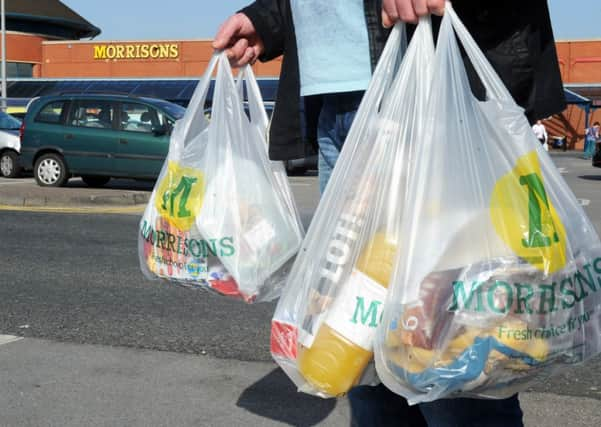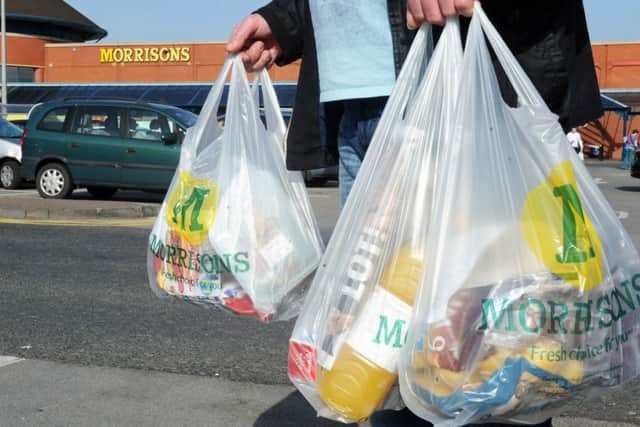Morrisons sees profits wiped out as it slumps to £176m loss


The Bradford-based firm reported underlying profits of £785m in the year to February 2, its lowest profit in five years as the group struggles to compete with German discounters Aldi and Lidl.
But this profit was wiped out by exceptional non-recurring costs and a writedown on underperforming businesses.
Advertisement
Hide AdAdvertisement
Hide AdThe group announced plans to sell off £1bn of its £9bn property portfolio in order to strengthen its balance sheet.


Morrisons, which forms the big four supermarkets alongside market leader Tesco, Leeds-based Asda and Sainsbury’s, said it now expects an underlying pre-tax profit of £325m to £375m over the coming year – half the level analysts had expected.
Analysts had pencilled in an underlying pre-tax profit of £732m in 2014-15.
The group said it would help fund price cuts by raising £1bn from selling off peripheral properties over three years – a figure that could disappoint activist investors including US hedge fund Elliott Associates which has called for Morrisons to hive off real estate into a separate company.
Advertisement
Hide AdAdvertisement
Hide AdMorrisons also aims to reduce its cost base by £1bn, through operating improvements and lower capital spending, and exiting non-core activities.
Chief executive Dalton Philips said the strategy was a bold and comprehensive response to the challenge being presented by the discounters.
While shoppers welcomed the news of price cuts and a price war between the main grocers, investors were not so impressed following a 12 per cent fall in the group’s share price to 205p.
“It doesn’t look great,” said one top 50 shareholder.
“The certainty with the strategy is that profits will be lower; what is less certain is that the lower prices will stem sales declines.”
Advertisement
Hide AdAdvertisement
Hide AdJohn Ibbotson, director of consultants Retail Vision, said the challenge presented by the discounters is more serious than anyone had initially realised. “It’s now a long-term structural thing.
“The middle is shrinking and it will keep on shrinking. It’s hitting Morrisons the worst because their position is worst.”
Industry data earlier this week showed sales at discounters Aldi and Lidl surging 33.5 per cent and 16.6 per cent respectively, although together they only account for around 7.5 per cent of the UK’s total grocery market.
Morrisons’ turnover fell two per cent to £17.7bn, with like-for-like sales down 2.8 per cent.
Advertisement
Hide AdAdvertisement
Hide AdAsked whether after four years in the job, he had the support of the board and shareholders, Mr Philips said: “When I joined four years ago we had no presence in online and convenience and we had antiquated systems.
“We’ve addressed those first three. We now have world leading online and a fantastic position on convenience.
“The fourth area to address is the discounters. We’re now dealing with it. This is the right thing for us to do.”
Asked whether he was worried about his position, he said: “Absolutely not.”
Advertisement
Hide AdAdvertisement
Hide AdChairman Sir Ian Gibson added: “You don’t make really bold steps like this without thinking it through. Yes we back the plan and we back the executive.”
Morrisons said it had been very encouraged by customers’ reaction to its online launch, which kicked off in Yorkshire earlier this year.
The grocer is already covering 20 per cent of UK households and is gearing up for its London debut.
The group said it had seen very low levels of doorstep rejections due to goods having too short a date life.
Advertisement
Hide AdAdvertisement
Hide AdIt saw 0.38 per cent of goods being returned for this reason.
It said it managed to deliver 96 per cent of orders on time and missing items, damage or substitution was reduced to 1.5 per cent of deliveries.
The group said its online business had annualised year end sales of £200m and it is now trialing a click and collect format.
Bernstein analysts said the plan for limited property sales was a disappointment.
Advertisement
Hide AdAdvertisement
Hide Ad“This is not as much as we would have wanted to have seen,” they said in a research note.
Despite the profit fall and warning, the group raised its 2013-14 dividend by 10 per cent to 13p a share and committed to a five per cent minimum rise in 2014-15 and a “progressive and sustainable” payout there- after.